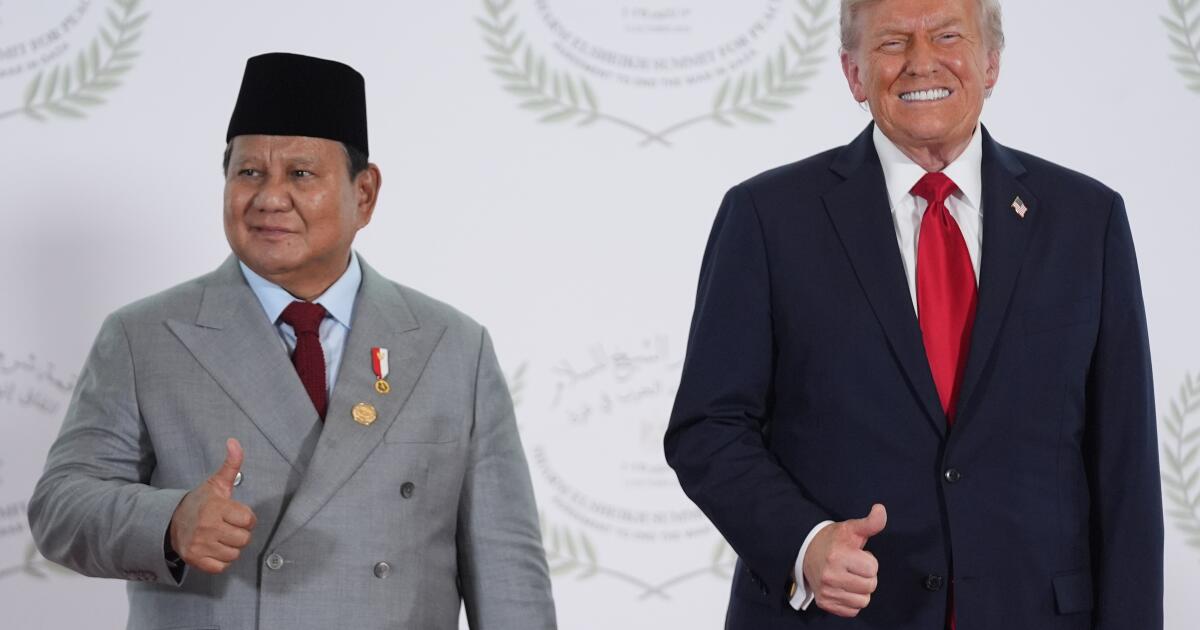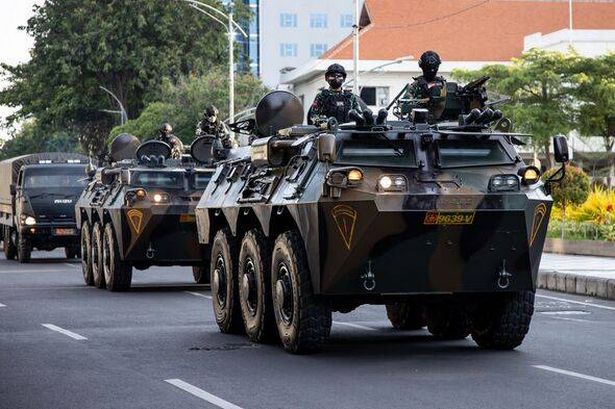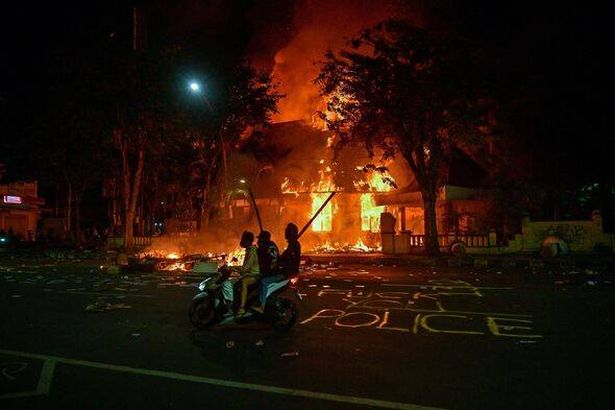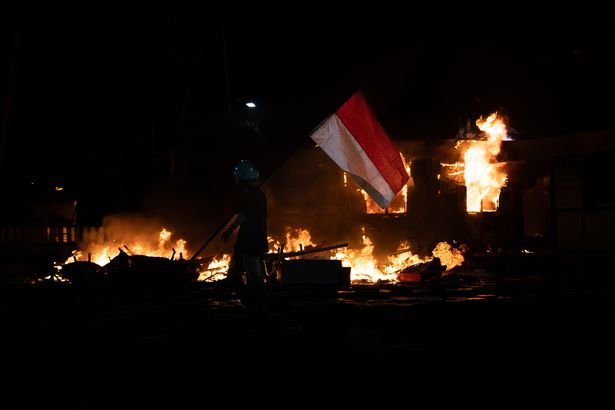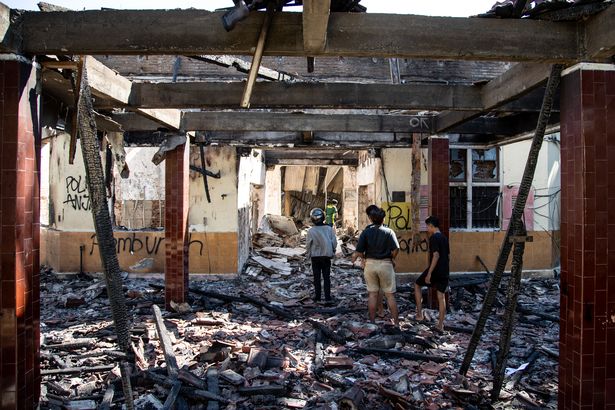The Foreign Office has issued updated travel advice for Indonesia after violent riots erupted across the country, leaving seven people dead and hundreds injured in the worst unrest the nation has seen for years
Brits planning a holiday to Bali have been issued an urgent safety warning as violent riots break out across Indonesia, resulting in seven fatalities and hundreds of injuries in the worst unrest the country has experienced in years.
The Foreign Office has updated its travel advice due to the increasing risk of civil disorder and terror attacks, following intense street fights between police and protesters throughout the vast archipelago.
The lethal chaos was sparked by public outrage over extravagant new parliamentary perks, leading to widespread demonstrations that have rapidly spread from the capital Jakarta to cities nationwide. This news comes as a report exposed the inside of the hellhole jail where British Angel Delight drug smugglers face terrifying ‘threats’.
Rampaging crowds have set regional parliament buildings ablaze, embarked on extensive looting sprees and engaged in fierce clashes with security forces as the political crisis intensifies.
The death toll continues to rise, with three individuals losing their lives in Makassar after irate protesters torched a parliament building, resulting in scenes of complete devastation, reports the Express.
The violence took a dramatic turn when 21 year old ride-hailing driver Affan Kurniawan was tragically killed by a police vehicle in Jakarta, sparking national outrage and igniting further waves of anti-government anger.
A student tragically lost his life during violent clashes in Yogyakarta, while a pensioner pedicab driver passed away after inhaling tear gas during confrontations in Solo, adding to the growing human toll of the political chaos.
Jakarta’s health office has confirmed a shocking 469 people have been injured since the violence erupted, with nearly 100 needing hospital treatment for their injuries.
President orders crackdown as terror threat looms
President Prabowo Subianto expressed his shock and disappointment over the killing of Kurniawan but has commanded police and military forces to take the “firmest possible action” against rioters as the situation spirals out of control.
“There are signs of unlawful acts, even leading to treason and terrorism,” he cautioned in a chilling statement that highlights the severity of the crisis engulfing the nation.
Rehayu Saraswati, a member of the ruling party, admitted the scale of the protests had taken the government by surprise.
She confessed to the BBC: “I don’t think any of us saw this coming. It happened very, very quickly within a matter of days.”
But she dismissed accusations that the government had been deaf to public concerns, adding: “We understand that the situation is difficult, and that the economy has been quite, I would say, challenging for some people.
“The recently announced cuts to the parliamentary budget and allowances are a way to show that we are listening.”
Molotov cocktails and snipers as military deployed
The violence has escalated to worrying levels, with protestors lobbing Molotov cocktails and firecrackers at police lines in Bandung, while thousands more have taken to the streets across Sumatra, Java, Borneo and Sulawesi.
Troops have been dispatched across Jakarta in scenes eerily similar to military rule, with snipers stationed in key strategic areas, checkpoints set up throughout the city, and schools forced to shut due to safety concerns.
The United Nations has called on Indonesia to probe allegations of “disproportionate force” used by police against demonstrators, underlining global concern over the spiralling crisis.
Protestors dismiss government concessions
Despite government efforts to defuse the situation, protest leaders have rejected the concessions – including scrapping the controversial allowance and banning overseas trips for MPs – as pitifully insufficient.
Muzammil Ihsan, leader of the country’s largest student group, delivered a resolute message: “The government must resolve deep-rooted problems.
“The anger on the streets is not without cause.”
Political pundits have cautioned that the unrest presents the first significant challenge for Subianto’s presidency and could seriously rattle investor confidence, with Indonesia’s stock index already plunging more than three percent on Monday as markets responded to the turmoil.
Foreign Office issues urgent travel warning
The UK Foreign Office is now urging British holidaymakers to avoid protests and large gatherings, emphasising that peaceful demonstrations can quickly turn violent.
In its updated travel advice, the FCDO warned: “Terrorists are likely to try to carry out attacks in Indonesia. Attacks could be indiscriminate, including in places visited by foreign nationals.
“Potential targets can include beach resorts, hotels, bars and restaurants, markets and shopping malls, tourist attractions, places of worship, foreign embassies, polling stations, ferry terminals and airports.”
Travellers are being advised to remain extra alert during national holidays, religious festivals and elections, when the terror threat becomes particularly acute.
Bali’s hidden perils revealed
Apart from the ongoing political turmoil, Bali presents considerable dangers that many British tourists don’t realise until it’s far too late.
Authorities have spotlighted worrying accounts of sexual attacks, drink tampering cases, methanol poisoning from fake alcohol, and violent bag-snatching in bustling tourist areas.
Holiday-makers are being urged to monitor drinks being made at all times, steer clear of potentially fatal homemade alcohol, and only buy drinks from properly authorised establishments to prevent poisoning.
The FCDO has also raised concerns about the ongoing risk of opportunistic theft and elaborate cons designed to exploit unwary tourists. British holidaymakers should pack only vital belongings, safeguard passports and bank cards constantly, and stick to licensed taxi firms like Bluebird, Silverbird or Express – whilst thoroughly verifying drivers correspond with app reservations.
Authorities issued a blunt warning that no overseas journey is entirely without danger, stating: “Read all advice carefully and ensure you have comprehensive travel insurance.”
